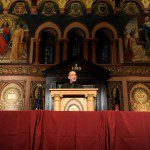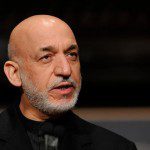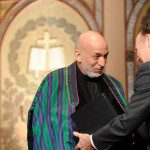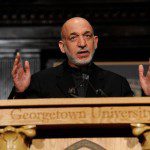Georgetown Stops for Karzai, Who Sees Afghanistan ‘Moving Forward’
By • January 16, 2013 0 1236
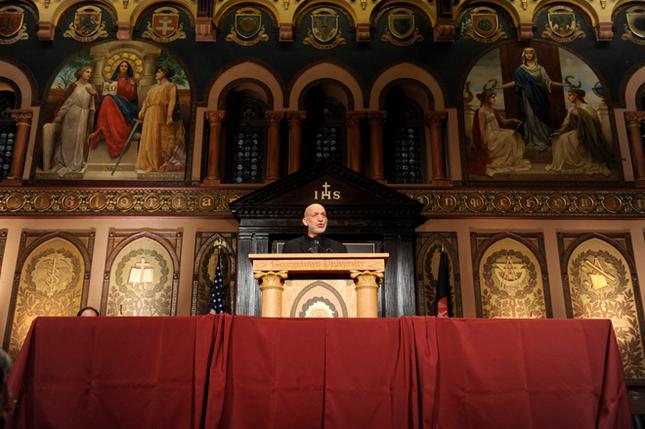
Afghan President Hamid Karzai visited Georgetown University Jan. 11 to give a speech, entitled “Afghanistan Beyond 2014: A Perspective on Afghan-U.S. Relations,” at Gaston Hall.
Before the speech, Karzai’s motorcade got presidential treatment and caused temporary roadblocks on the west side of Georgetown, leaving motorists stopped on 34th and 35th street and other streets that intersected with M Street. One woman who lives on the 3600 block of Prospect Street, part of the motorcade route, was ordered by police not to drive to her nearby home, which has a garage, but in the opposite direction into the campus. A block away, she left her car with its lights flashing to gather items from her home and then travel with her two children back to her car to pick a third child. She and most affected motorists were halted for at least 25 minutes, as the university awaited the Afghan president.
Karzai met President Barack Obama earlier that Friday at the White House to discuss the withdrawal of most U.S. troops in Afghanistan in the months and year ahead and the transition of Afghan troops as U.S. troops take on a supporting and training role by the end of 2014.
It was a time for reflection, and Karzai appeared relaxed during his third visit Georgetown. He recalled his previous visit for an honorary degree from the university, “when I was popular,” he said. Karzai smiled and added that he expected his son “will be studying here.”
Setting the tone, John DeGioia, president of Georgetown University, introduced Karzai and said that 2014 would be a new era for the U.S. and Afghanistan, while explaining that the speech was an example of “Catholic, Jesuit discourse.”
Karzai reminded all that his country and the U.S. had come together after the September 11 attacks in 2001 “for a great cause”: to free the world of terrorists, liberate Afghanistan and take down the Taliban. Within one-and-half months, Karzai’s country was free, he said, “with the help of the United States and allies.”
There have been “serious bumps,” Karzai said, as he listed the improvements of everyday life in Afghanistan, including the education of girls and increased use of mobile phones, as one woman’s phone buzzed within her purse in the back of the hall.
“The war on terror has been costly,” Karzai said, to the U.S., allies and Afghanistan. “Tens of thousands of civilians have been lost,” he said. “There is blame on both sides. I am aware of your complaints in the media . . . and of me.”
“The relationship continued out of a reality that Afghanistan would always be better off in close contact and partnership with the United States,” he said. “Is the future certainly good for us? Does it have dangers on its way? Are we certain to move forward? Will this partnership work? Yes.”
And Karzai’s prediction for Afghanistan’s future? There would be improvements but still violence, but the sweep of progress will not stop. He used the same phrase Obama had used for the U.S.-Afghan relationship: “moving forward.” Gain would be consolidated with most of the “suffering behind us.” The Afghan president closed his talk with the words of poet Robert Frost: “promises to keep . . . and miles to go.”
After the speech, Karzai did not take questions directly from the audience. Questions from student groups were asked by professor Phyllis Magrab, vice chair of the U.S.-Afghan Women’s Council, which is headquartered at the university. One question was from the Lecture Fund which cited a New York Times article about Taliban members who turned in their weapons and had not yet gotten their promised employment. Karzai seemed surprised and said he would check out the Times story.
Student Thomas Gibbons-Neff, president of the student veterans group, who was twice deployed to Afghanistan, asked what Karzai would “say to an American family that has lost a son or daughter in Afghanistan and what would you say they died for.”
“The United States came to Afghanistan for the security of the United States and by extension the rest of the world and also for Afghans,” Karzai answered. “Those unfortunate incidents of lives lost in Afghanistan were for the safety and security of the United States for the American people and also by extension for the rest of us in the international community.”
- Afghan President Hamid Karzai at Gaston Hall, Jan. 11 | Courtesy Georgetown University

